Mass Schedule of Rev. Fr. David Hewko
February 2025 |
||||||
|---|---|---|---|---|---|---|
| Sun | Mon | Tue | Wed | Thu | Fri | Sat |
|
1
|
||||||
|
2
|
3
|
4
|
5
|
6
|
7
|
8
|
|
9
|
10
|
11
|
12
|
13
|
14
|
15
|
|
16
|
17
|
18
|
19
|
20
|
21
|
22
|
|
23
|
24
|
25
|
26
|
27
|
28
|
|
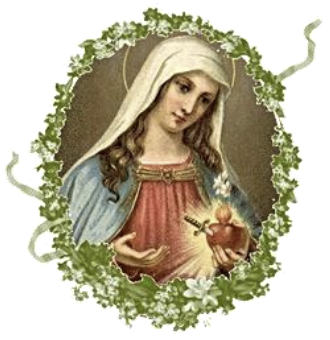
Act of Spiritual Communion
As I cannot this day enjoy the happiness of assisting at the holy Mysteries, O my God! I transport myself in spirit at the foot of Thine altar; I unite with the Church, which by the hands of the priest, offers Thee Thine adorable Son in the Holy Sacrifice; I offer myself with Him, by Him, and in His Name. I adore, I praise, and thank Thee, imploring Thy mercy, invoking Thine assistance, and presenting Thee the homage I owe Thee as my Creator, the love due to Thee as my Savior.
Apply to my soul, I beseech Thee, O merciful Jesus, Thine infinite merits; apply them also to those for whom I particularly wish to pray. I desire to communicate spiritually, that Thy Blood may purify, Thy Flesh strengthen, and Thy Spirit sanctify me. May I never forget that Thou, my divine Redeemer, hast died for me; may I die to all that is not Thee, that hereafter I may live eternally with Thee. Amen.
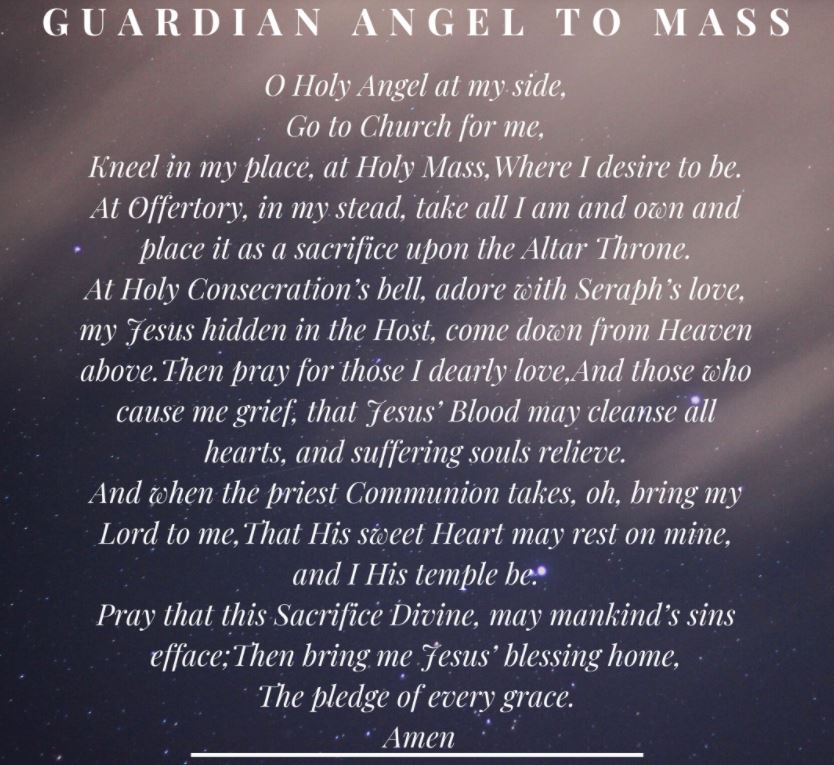
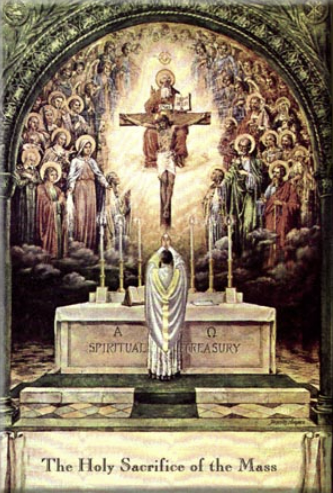
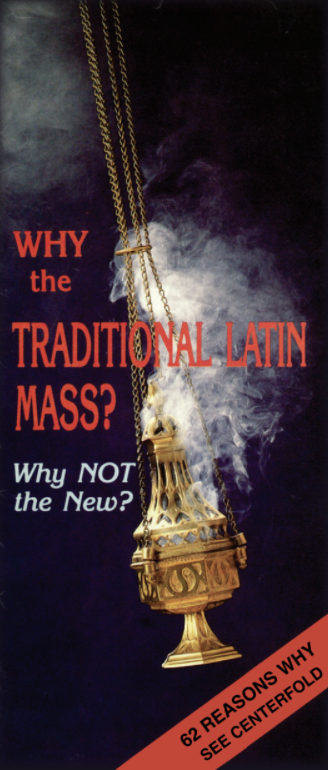
To view/download the online brochure click here: Why the Traditional Latin Mass Why NOT the New 62 Reasons
Also, Fr. Hewko has reprinted this excellent brochure (originally printed by the SSPX in 1986). You can request copies of this brochure either in writing directly to Fr. Hewko at:
Oratory of the Sorrowful Heart of Mary
Rev. Fr. David Hewko
66 Goves Lane
Wentworth, New Hampshire 03282
or via email at: sspxmariancorps@gmail.com
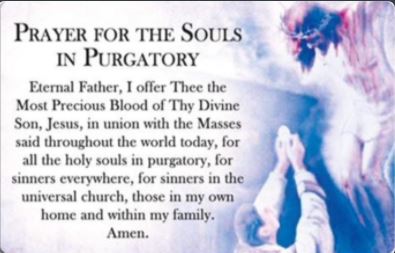
 |
||||||||||||||||||||||||||||||||||||||||||||
|
||||||||||||||||||||||||||||||||||||||||||||
|
|
||||||||||||||||||||||||||||||||||||||||||||
 |
||||||||||||||||||||||||||||||||||||||||||||
|
||||||||||||||||||||||||||||||||||||||||||||
 |
||||||||||||||||||||||||||||||||||||||||||||
|
||||||||||||||||||||||||||||||||||||||||||||
|
|
||||||||||||||||||||||||||||||||||||||||||||
|
||||||||||||||||||||||||||||||||||||||||||||
|
||||||||||||||||||||||||||||||||||||||||||||
|
|
||||||||||||||||||||||||||||||||||||||||||||
 |
||||||||||||||||||||||||||||||||||||||||||||
|
||||||||||||||||||||||||||||||||||||||||||||
|
||||||||||||||||||||||||||||||||||||||||||||
|
|||||||||||||||||||||||||||||||||||||||||||||||||||||||||||
|
|
|||||||||||||||
 |
|||||||||||||||
|
|||||||||||||||
|
|
|||||||||||||||
 |
|||||||||||||||
|
|||||||||||||||
|
|
|||||||||||||||
 |
|||||||||||||||
|
|||||||||||||||
|
|
|||||||||||||||
 |
|||||||||||||||
|
|||||||||||||||
|
|||||||||||||||
 |
|||||||||||||||||||||||||||||||||||||||||||
|
Sorrowful Heart of Mary Oratory Society of Saint Pius X – Marian Corps |
|||||||||||||||||||||||||||||||||||||||||||
|
|
|||||||||||||||||||||||||||||||||||||||||||
|
|||||||||||||||||||||||||||||||||||||||||||
 |
|||||||||||||||||||||||||||||||||||||||||||
|
As the vine I have brought forth a pleasant odor: and my flowers are the fruit of honor and riches. I am the mother of fair love, and of fear, and of knowledge, and of holy hope. In me is all grace of the way and of the truth, in me is all hope of life and of virtue. Come over to me, all ye that desire me, and be filled with my fruits. For my spirit is sweet above honey, and my inheritance above honey and the honeycomb. My memory is unto everlasting generations. They that eat me, shall yet hunger: and they that drink me, shall yet thirst. He that hearkeneth to me, shall not be confounded: and they that work by me, shall not sin. – Eccl. xxiv:23 |
|||||||||||||||||||||||||||||||||||||||||||
 |
|||||||||||||||||||||||||||||||||||||||||||
|
May is consecrated to the Blessed Virgin Mary. To honor our Blessed Mother & Queen, it is a traditional and praiseworthy practice for Catholic families to dedicate a special May Altar to enthrone Mary Immaculate as Queen of their home. Throughout this month, an altar is adorned with flowers, candles, and a blessed statue or image of Our Lady; giving her an honored throne where all will see her and often pray to her. It is especially recommended to consecrate the family to the Immaculate Heart of Mary in a solemn, family ceremony. If possible, ask a Traditional Catholic priest to perform the ceremony, otherwise the head of the family can do so. Here are instructions of the Family Consecration Ceremony. Oratory May Crowning Thursday, May 9th – 4:30 PM |
|||||||||||||||||||||||||||||||||||||||||||
|
|
|||||||||||||||||||||||||||||||||||||||||||
 |
|||||||||||||||||||||||||||||||||||||||||||
|
Necessity of Devotion to the Blessed Virgin “If you persevere till death in true devotion to Mary, your salvation is certain …an infallible mark of reprobation is to have no esteem and love for the holy Virgin.” – St. Louis de Montfort The conduct which the Three Persons of the Most Holy Trinity have deigned to pursue in the Incarnation and the first coming of Jesus Christ, They still pursue daily, in an invisible manner, throughout the whole Church; and They still pursue it even to the consummation of ages in the last coming of Jesus Christ. God the Father made an assemblage of all the waters and He named it the sea [mare]. He made an assemblage of all His graces and called it Mary [Maria]. This great God has a most rich treasury in which He has laid up all that He has of beauty and splendor, of rarity and preciousness, including even His Own Son: and this immense treasury is none other than the Blessed Virgin Mary, whom the Saints have named The Treasure of the Lord, out of whose plenitude all men are made rich. God the Son has communicated to His Mother all that he acquired by His life and His death; His infinite merits and His admirable virtues; and He has made her the treasurer of all that His Father gave Him for an inheritance. It is by her that He applies His merits to His members, and that He communicates His virtues, and distributes His graces. She is His mysterious canal; she is His aqueduct, through which He makes His mercies flow gently and abundantly. To Mary, His faithful spouse, God the Holy Ghost has communicated His unspeakable gifts; and He has chosen her to be the dispenser of all He possesses, in such wise that she distributes to whom she wills, as much as she wills, as she wills and when she wills, all His gifts and graces. The Holy Ghost gives no heavenly gift to men which He does not have pas through her virginal hands. Such has been the will of God, Who has willed that we should have everything through Mary; so that she who, impoverished, humbled, and who hid herself even unto the abyss of nothingness by her profound humility her whole life long, should now be enriched and exalted and honored by the Most High. Such are the sentiments of the Church and the holy Fathers. [Cf., among others, St. Bernard and St. Bernardine of Siena.] If I were speaking to the freethinkers of these times, I would prove what I have said so simply here, drawing it out more at length, and confirming it by the Holy Scriptures and the Fathers, quoting the original passages, and adducing various solid reasons . . . But as I speak particularly to the poor and simple, who being of good will, and having more faith than the common run of scholars, believe more simply and meritoriously, I content myself with stating the truth quite plainly, without stopping to quote the Latin passages . . . Nevertheless, without making much research, I shall not fail to bring forward some of them from time to time. But now let us go on with our subject. Inasmuch as grace perfects nature, and glory perfects grace, it is certain that Our Lord is still, in Heaven, as much the Son of Mary as He was on earth; and that, consequently, He has retained the obedience and submission of the most perfect Child to the best of all mothers. But we must take great pains not to conceive this dependence on any abasement or imperfection in Jesus Christ. For Mary is infinitely below her Son, Who is God, and therefore she does not command Him as a mother here below would command her child who is below her. Mary, being altogether transformed into God by grace and by the glory which transforms ass the Saints into Him, asks nothing, wishes nothing, does nothing contrary to the eternal and immutable will of God. When we read then in the writings of Ss. Bernard, Bernardine, Bonaventure and others that in Heaven and on earth everything, even God Himself, is subject to the Blessed Virgin, they mean that the authority which God has been well pleased to give her is so great that it seems as if she had the same power as God; and that her prayers and petitions are so powerful with God that they always pass for commandments with His Majesty, Who never resists the prayer of His dear Mother, because she is always humble and conformed to His will. If Moses, by the force of his prayer, stayed the anger of God against the Israelites in a manner so powerful that the most high and infinitely merciful Lord, being unable to resist him, told him to let Him alone that He might be angry with and punish that rebellious people, what must we not, with much greater reason, think of the prayer of the humble Mary, that worthy Mother of God, which is more powerful with His Majesty than the prayers and intercessions of all the Angels and Saints both in Heaven and on earth? In the Heavens, Mary commands the Angels and the blessed. As a recompense for her profound humility, God has empowered her and commissioned her to fill with Saints the empty thrones from which the apostate Angels fell by pride. The will of the Most High, Who exalts the humble [Luke 1:52], is that Heaven, earth and Hell bend, with good will or bad will, to the commandments of the humble Mary [St. Bonaventure, Psalt. majus B.V., Cant. instar, can. Trium puerorum.] whom He has made sovereign of Heaven and earth, general of His armies, treasurer of His treasures, dispenser of His graces, worker of His greatest marvels, restorer of the human race, Mediatrix of men, the exterminator of the enemies of God, and the faithful companion of His grandeurs and triumphs. God the Father wishes to have children by Mary till the consummation of the world; as He speaks to her these words: “Dwell in Jacob” [Ecclus. 24:13]; that is to say: Make your dwelling and residence in My predestined children, prefigured by Jacob, and not in the reprobate children of the devil, prefigured by Esau. Just as in the natural and corporal generation of children there are a father and a mother, so in the supernatural and spiritual generation there are a Father, Who is God, and a Mother, who is Mary. All the true children of God, the predestinate, have God for their Father and Mary for their Mother. He who has not Mary for his Mother has not God for his Father. This is the reason why the reprobate, such as heretics, schismatics and others, who hate our Blessed Lady or regard her with contempt and indifference, have not God for their Father, however much they boast of it, simply because they have not Mary for their Mother. For if they had her for their Mother, they would love and honor her as a true child naturally loves and honors the mother who has given him life. The most infallible and indubitable sign by which we may distinguish a heretic, a man of bad doctrine, a reprobate, from one of the predestinate, is that the heretic and the reprobate have nothing but contempt and indifference for Our Lady, endeavoring by their words and examples to diminish the veneration and love of her, openly or hiddenly, and sometimes by misrepresentation. Alas! God the Father has not told Mary to dwell in them, for they are Esau. God the Son wishes to form Himself, and so to speak, to incarnate Himself in His members every day, by His dear Mother, and He says to her: “Take Israel for your inheritance.” [Ecclus. 24:13] It is as if He had said God the Father has given Me for an inheritance all the nations of the earth, all men, good and bad, predestinate and reprobate. The ones I will lead with a rod of gold and the others with a rod of iron. Of the ones , I will be the Father and the Advocate; of the others, the Just Punisher; and of all, the Judge. But as for you, My dear Mother, you shall have for your heritage and possession only the predestinate, prefigured by Israel; and as their Mother, you shall bring them forth and take care of them; and as their sovereign, you shall conduct them, govern them and defend them. “This man and that man is born in her” [Ps. 86:5], says the Holy Ghost through the royal Psalmist. According to the explanation of some of the Fathers, [for instance, St. Bonaventure and Origen] the first man that is born in Mary is the Man-God, Jesus Christ; the second is mere man, the child of God and Mary by adoption. If Jesus Christ, the Head of men, is born in her, then the predestinate, who are the members of that Head, ought also to be born in her, by a necessary consequence. One and the same mother does not bring forth into the world the head without the members, or the members without the head; for this would be a monster of nature. So in like manner, in the order of grace, the head and the members are born of one and the same Mother; and if a member of the Mystical Body of Jesus Christ (that is to say, one of the predestinate) were born of any other mother than Mary, who has produced the Head, he would not be one of the predestinate, nor a member of Jesus Christ, but simply a monster in the order of grace. Besides this, Jesus being at present as much as ever the fruit of Mary – as Heaven and earth repeat thousands and thousands of times a day, “and blessed is the fruit of thy womb, Jesus” – it is certain that Jesus Christ is, for each man in particular who possesses Him, as truly the fruit and the work of Mary as He is for the whole world in general; so that if any one of the faithful has Jesus Christ formed in his heart, he can say boldly, “All thanks be to Mary! What I possess is her effect and her fruit, and without her I should never have had it.” We can apply to her more than St. Paul applied to himself the words: “I am in labor again with all the children of God, until Jesus Christ my Son be formed in them in the fullness of His age.” [Cf. Gal. 4:19] St. Augustine, surpassing himself, and going beyond all I have yet said, affirms that all the predestinate, in order to be conformed to the image of the Son of God, are in this world hidden in the womb of the most holy Virgin, where they are guarded, nourished, brought up and made to grow by that good Mother until she has brought them forth to glory after death, which is properly the day of their birth, as the Church calls the death of the just. O mystery of grace, unknown to the reprobate, and but little known even to the predestinate! God the Holy Ghost wishes to form elect for Himself in her and by her, and He says to her: “Strike the roots,” My Well-beloved and My Spouse, “of all your virtues in My elect” [Ecclus. 24:13] in order that they may grow from virtue to virtue and from grace to grace. I took so much complacence in you when you lived on earth in the practice of the most sublime virtues, that I desire still to find you on earth, without your ceasing to be in Heaven. For this end, reproduce yourself in My elect, that I may behold in them with complacence the roots of your invincible faith, of your profound humility, of your universal mortification, of your sublime prayer, of your ardent charity, of your firm hope and of all your virtues. You are always My spouse, as faithful, as pure and as fruitful as ever. Let your faith give Me My faithful, your purity, My virgins, and your fertility, My temples and My elect. When Mary has struck her roots in a soul, she produces three marvels of grace, which she alone can produce, because she alone is the fruitful Virgin who never has had, and never will have, her equal in purity and in fruitfulness. Mary has produced, together with the Holy ghost, the greatest thing which has ever been or will ever be, a God-Man; and she will consequently produce the greatest saints that there will be in the end of time. The formation and the education of the great saints who shall come at the end of the world are reserved for her. For it is only that singular and miraculous Virgin who can produce, in union with the Holy Ghost, singular and extraordinary things. When the Holy Ghost, her Spouse, has found Mary in a soul, He flies there. He enters there in His fullness; He communicates Himself to that soul abundantly, and to the full extent to which it makes room for His spouse. Nay, one of the greatest reasons why the Holy Ghost does not now do startling wonders in our souls is because He does not find there a sufficiently great union with His faithful and inseparable spouse. I say “inseparable” spouse, because since that Substantial Love of the Father and the Son has espoused Mary, in order to produce Jesus Christ, the Head of the elect, and Jesus Christ in the elect, He has never repudiated her, because she has always been fruitful and faithful. We may evidently conclude, then, from what I have said, first of all, that Mary has received from God a great domination over the souls of the elect; for she cannot make her residence in them as God the Father ordered her to do, and as their mother, form, nourish and bring them forth to eternal life, and have them as her inheritance and portion, form them in Jesus Christ and Jesus Christ in them, and strike the roots of her virtues in their hearts and be the inseparable companion of the Holy Ghost in all His works of grace – she cannot, I say, do all these things unless she has a right and a domination over their souls by a singular grace of the Most High, Who, having given her power over His only and natural Son, has given it also to her over His adopted children, not only as to their bodies, which would be but a small matter, but also as to their souls. The learned and pious Jesuit, Suarez, the erudite and devout Justus Lipsius, doctor of Louvain, and many others have proved invincibly, from the sentiments of the Fathers (among others: Saint Augustine, Saint Ephrem, Deacon of Edessa, Saint Cyril of Jerusalem, Saint Germanus of Constantinople, Saint John Damascene, Saint Anselm, Saint Bernard, Saint Bernadine, Saint Thomas and Saint Bonaventure) that devotion to our Blessed Lady is necessary to salvation, and that it is an infallible mark of reprobation to have no esteem and love for the holy Virgin; while on the other hand, it is an infallible mark of predestination to be entirely and truly devoted to her. “To be devout to you, O holy Virgin,” says Saint John Damascene, “is an arm of salvation which God gives to those whom He wishes to save.” Mary is the Queen of heaven and earth by grace, as Jesus is the King of them by nature and by conquest. Now, as the kingdom of Jesus Christ consists principally in the heart or the interior of man – according to the words, “The kingdom of God is within you” [Luke 17:21] – in like manner the kingdom of our Blessed Lady is principally in the interior of man; that is to say, his soul. And it is principally in souls that she is more glorified with her Son than in all visible creatures, and so we can call her, as the Saints do, the Queen of All Hearts. ______________________________ |
|||||||||||||||||||||||||||||||||||||||||||
|
|||||||||||||||||||||||||||||||||||||||||||
|
Total Consecration to Jesus through Mary is not a one-time commitment; it is a way of life. The saintly author formulated this as an official consecration to Mary and it is known as the Holy Slavery with the end object of perfect union with Jesus Christ. It consists of a period of thirty-three days in honor of the years Our Lord spent on earth. This “prayerful preparation” is comprised of prayers taken from Holy Scripture, readings from the “Imitation of Christ” and from the saint’s own writings based on Church teachings. What the novitiate is to religious life, and basic training is to soldiers or athletes, this preparation is towards the total service to Mary. If you spend it well, you will begin to be consumed with the thought of pleasing Our Lord and His Mother in all you do. Out of love for her you will learn to sacrifice whatever is displeasing to her and her Divine Son; and from there you will have a singleness of purpose and earnestly do all through her, with her, in her and for her. This is True Devotion. To become skillful in any field of endeavor, we go to an expert in that field and ask for advice or, better yet, we place ourselves under the tutelage of that expert. We see this done in the realm of sports all the time, whether it is local competition, professional sports, or the Olympic games. Behind every trainee, there is a coach. So also, must it be in the spiritual realm. In the great competitive struggle to overcome the enemies of our salvation: the world, the flesh and the Devil, and to become a true disciple of Jesus Christ, we must look for advice from the Church and the writings of the saints – those spiritual giants who have gone before us. Best of all, however, is to place ourselves under the guardianship and guidance of the greatest and holiest creature that God has ever made, the Immaculata. Saint Louis-Marie Grignion de Montfort put his whole heart and soul into the task of finding the best way to place oneself under the patronage of the Mother of God. After extensive research into the writings of the great saints, he found the best method: slavery to Mary. This approach was not new, but at that time little known and not thoroughly formulated. Father Grignion developed and expounded this method, and defended it too, in the beloved, aforementioned book, “True Devotion To Mary.” The essence of this true devotion is the total offering of one’s self and all one’s goods, both temporal and spiritual, to Our Lady – in as much as the duties of one’s state in life will allow – and then living as completely dependent upon her as a slave to a Queen. The practice of this humble relationship is the source of many unique graces and privileges. This Queen will undoubtedly use us, and all that we give her, to the furthering of the glory of God and His Kingdom on earth. This slavery, or total servitude to the Blessed Virgin Mary is a stumbling block to a world obsessed with asserting personal rights. The slaves of Mary, however, willingly place themselves in the service of that most loving Queen with no desire for any payment, reward or termination of service. Our Lady, in turn, uses her servants to achieve their own sanctification, the salvation of countless other souls and the realization of her triumphant reign foretold by God in the Book of Genesis: She shall crush thy head, and repeated in the Fatima message: “In the end my Immaculate Heart will triumph.” Our Lady asks us all for consecration to her Immaculate Heart. A consecration which, among other things, calls for the devotion of the Five First Saturdays and the daily recitation of the Holy Rosary; all done in reparation to her Immaculate Heart. It involves a striving to fulfill her requests for prayer and sacrifices for the conversion of sinners and in reparation for offenses against the Divine Majesty. Living that consecration means to imitate Our Lady’s virtues and to place in her hands the flowers of the little sacrifices it takes to fulfill our daily duty; in a spirit of reparation for the salvation of souls, thereby hastening the day of the triumph of her Immaculate Heart. To everyone who makes that consecration and sincerely tries to live it, the words of Our Lady at Fatima to little Lucia fittingly apply: “I will never leave you; my Immaculate Heart will be your refuge and the way that will lead you to God.” |
|||||||||||||||||||||||||||||||||||||||||||
 |
|||||||||||||||||||||||||||||||||||||||||||
|
|||||||||||||||||||||||||||||||||||||||||||
How To Make The Five First Saturdays
|









